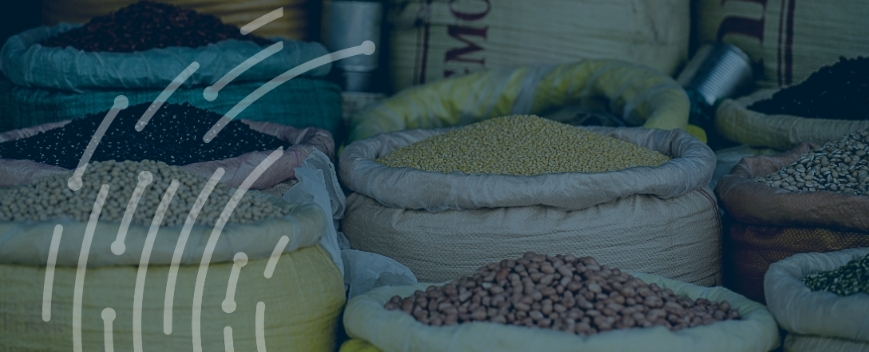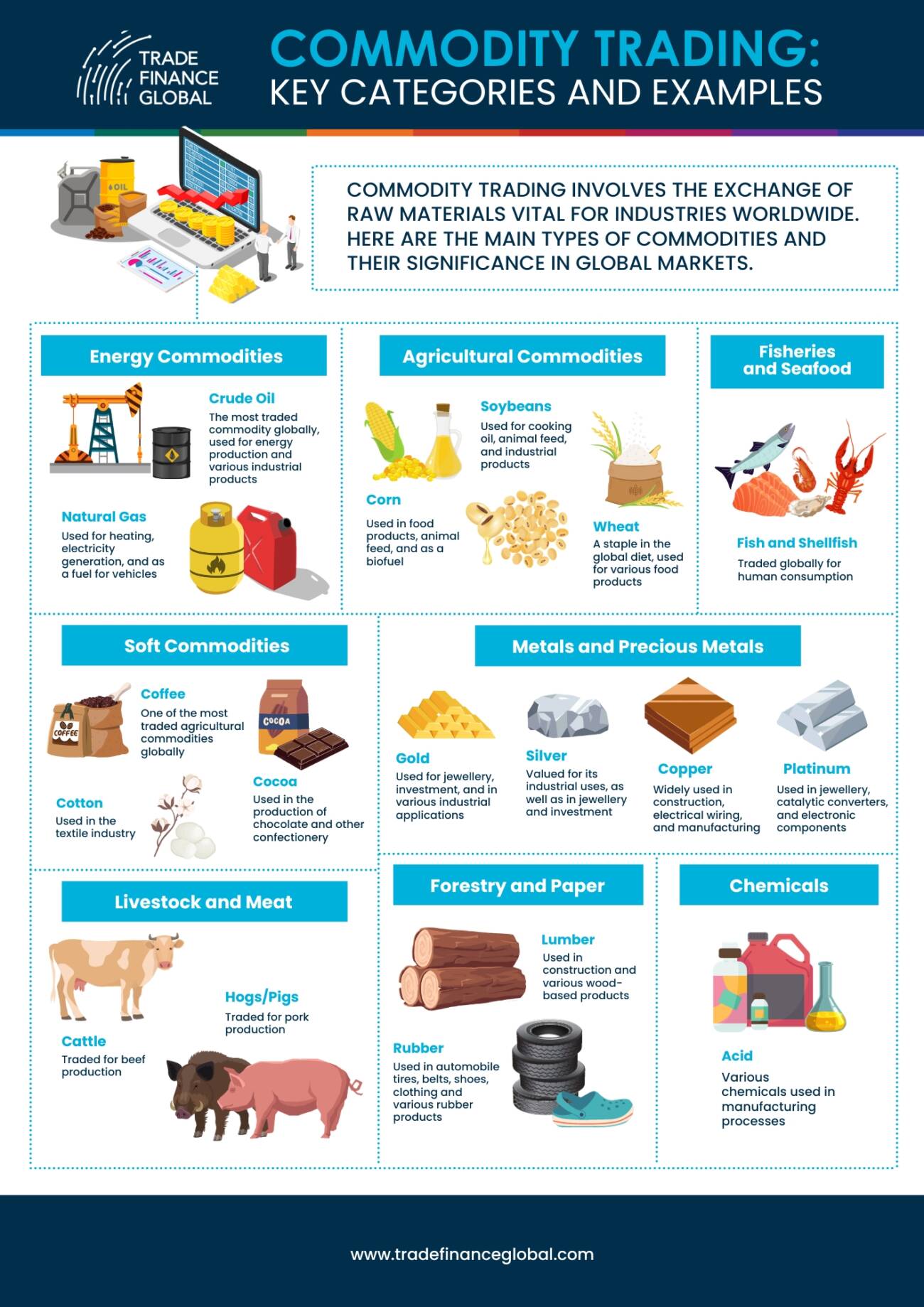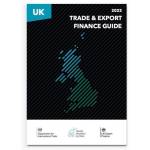Commodity Trading

Access trade, receivables and supply chain finance
We assist companies to access trade and receivables finance through our relationships with 270+ banks, funds and alternative finance houses.
Get StartedCommodity tradings, a cornerstone of global economic activity, is a complex yet crucial aspect of the world economy. It involves the exchange of raw materials that form the bedrock of various industries. At Trade Finance Global, we specialise in the intricate dynamics of commodity trading and risk management, providing businesses with the insights and tools they need to navigate this challenging landscape.
Commodity trading is a multifaceted process, encompassing a range of activities from pre-trade operations such as market analysis and contract negotiation, to post-trade activities like settlement and risk management. It also involves the critical aspect of commodity trade finance, where financing solutions are structured to support commodity traders.
At Trade Finance Global, we understand the complexities of this landscape. We provide the latest insights into pre and post-trade operations, helping businesses anticipate market trends and manage risks effectively. Our expertise in commodity trade finance enables us to offer tailored financing solutions that meet the unique needs of commodity traders.

Introduction to commodity trading
Commodity trading is the buying and selling of raw materials and primary products such as oil, metals, grains, and softs (like coffee and sugar), either for physical delivery or as financial contracts. It plays a fundamental role in the global economy by facilitating price discovery, risk management, and resource allocation. Traders operate across both physical markets and financial exchanges, providing liquidity, supply chain integration, and speculative opportunities.
This guide provides an in-depth look at commodity trading: its history, market structure, trading instruments, participants, strategies, advantages, disadvantages, and future trends. It is designed for those seeking a foundational and advanced understanding of how commodity markets function.
History of commodity trading
Commodity trading is one of the oldest forms of commerce, dating back to ancient civilisations in Mesopotamia and Egypt. Grain exchanges existed in Babylonian times, while Japanese rice exchanges in the 17th century laid the foundation for modern futures trading.
The Chicago Board of Trade (CBOT), founded in 1848, formalised commodity trading in the United States by creating standardised futures contracts. This enabled traders and producers to hedge against future price movements, reducing volatility and encouraging investment. Over time, exchanges like NYMEX (New York Mercantile Exchange), ICE (Intercontinental Exchange), and LME (London Metal Exchange) expanded the reach and scope of global commodity markets.
Today, commodity markets are digital, global, and highly integrated with financial markets, offering a range of products beyond just physical delivery.
Types of commodities
Commodities are broadly classified into four categories:
1. Energy
- Crude oil (WTI, Brent)
- Natural gas
- Heating oil
- Coal
2. Metals
- Precious metals: gold, silver, platinum
- Base metals: copper, aluminium, zinc, lead
- Minor/critical metals: lithium, cobalt, nickel
3. Agriculture
- Grains: wheat, corn, soybeans, rice
- Oilseeds: rapeseed, sunflower
- Softs: coffee, cocoa, sugar, cotton
4. Livestock
- Live cattle
- Lean hogs
- Feeder cattle
These products are traded on regulated exchanges or through over-the-counter (OTC) contracts.
Commodity trading markets
Physical markets
Physical commodity trading involves the exchange of goods for delivery. Traders negotiate contracts, organise logistics, and manage storage and transportation.
- Spot contracts: immediate delivery
- Forward contracts: future delivery at agreed terms
Derivatives markets
Financial instruments based on the price of underlying commodities allow participants to hedge or speculate. The most common include:
- Futures: standardised contracts traded on exchanges
- Options: rights to buy or sell futures at a specific price
- Swaps: OTC instruments for custom risk management
Major exchanges:
- CME Group (includes CBOT and NYMEX)
- Intercontinental Exchange (ICE)
- London Metal Exchange (LME)
- Dalian Commodity Exchange (DCE)
Market participants
A range of actors operate within commodity markets:
Producers
- Oil companies, miners, farmers
- Use futures to hedge against price drops
Consumers
- Manufacturers, food companies, energy firms
- Lock in input costs to manage margins
Traders and brokers
- Intermediaries connecting supply and demand
- Execute arbitrage and logistics strategies
Speculators
- Hedge funds, proprietary traders, retail investors
- Trade on price movements for profit
Governments and agencies
- Central banks (e.g., gold reserves)
- Strategic reserves (e.g., petroleum)
Clearing houses and exchanges
- Provide infrastructure and counterparty risk mitigation
Trading strategies
Commodity traders apply a range of approaches:
Hedging
Used by producers or consumers to protect against adverse price movements. A wheat farmer, for instance, may sell wheat futures to lock in prices ahead of harvest.
Speculation
Traders anticipate price movements based on fundamentals, technical indicators, or macroeconomic trends.
Arbitrage
Exploiting price differences between markets or contracts:
- Geographical arbitrage
- Calendar spreads
- Cross-commodity spreads
Systematic trading
Algorithmic and quantitative models designed to capture patterns across vast datasets.
Physical trading with optionality
Securing physical flows and using storage, transport, or blending to optimise margins.
Price drivers
Commodity prices are influenced by multiple factors:
- Supply and demand fundamentals
- Geopolitical events
- Currency movements (especially USD)
- Interest rates and inflation
- Weather and climate conditions
- Inventory levels and seasonal cycles
- Transportation and logistical disruptions
Understanding these dynamics is essential for managing risk and forecasting movements.
Advantages of commodity trading
- Diversification: Low correlation with traditional asset classes like equities or bonds
- Hedging: Enables risk management for producers and consumers
- Liquidity: Major commodities are highly liquid, especially in futures markets
- Leverage: Futures and options allow for exposure with limited capital
- Inflation hedge: Physical assets can retain value during inflationary periods
Disadvantages and cautions
- Volatility: Prices can be subject to sharp and unpredictable moves
- Leverage risk: Margin trading can lead to significant losses
- Storage and logistics: Physical trading involves operational complexity
- Regulatory risk: Varies by jurisdiction and can change unexpectedly
- Counterparty risk: Especially in OTC markets
Traders must maintain robust risk management frameworks and adhere to regulatory standards.
Risk management tools
Effective commodity trading relies on disciplined risk control:
- Position limits
- Stop-loss and take-profit orders
- Portfolio diversification
- Mark-to-market valuation
- Value-at-Risk (VaR) modelling
Risk management departments in trading firms work closely with front-office traders and compliance teams.
Technology and digitalisation
Technology has transformed commodity markets:
- Electronic trading platforms
- Real-time data analytics
- Blockchain for traceability and smart contracts
- Artificial intelligence for price prediction and optimisation
Digitalisation reduces transaction costs, increases transparency, and enhances decision-making.
Commodity trade finance
Given the capital-intensive nature of physical commodity trades, financing plays a critical role. Trade finance products include:
- Letters of credit
- Bills of exchange
- Structured commodity finance
- Inventory and warehouse finance
Banks and specialised trade finance providers assess risks associated with counterparty, country, and commodity.
Regulation and compliance
Key regulatory bodies include:
- U.S. Commodity Futures Trading Commission (CFTC)
- European Securities and Markets Authority (ESMA)
- Financial Conduct Authority (FCA, UK)
Regulations cover:
- Market conduct and transparency
- Position limits
- Anti-money laundering (AML) and sanctions
- Know Your Customer (KYC) procedures
Environmental, social, and governance (ESG)
Sustainability is reshaping commodity markets. ESG considerations now influence:
- Investment decisions
- Supply chain due diligence
- Reporting requirements
- Carbon pricing and emissions trading schemes
For example, investors may avoid crude oil while supporting renewable energy commodities like lithium.
Case examples
Copper trading and electric vehicles
Rising demand for EVs has boosted copper prices due to its use in batteries and wiring. Traders anticipate policy trends and supply constraints to take positions.
Agricultural trading and climate shocks
A drought in Argentina may reduce soybean output, pushing prices higher. Traders use weather models and crop reports to speculate or hedge exposure.
Future trends
- Green commodities: Growth in renewable energy markets and low-carbon metals
- Decentralised trading: Blockchain-based peer-to-peer platforms
- Data-driven decisions: Big data and AI integration
- Regulatory harmonisation: Especially across OTC and exchange-traded products
- Digital commodity tokens: Tokenisation of oil, gold, or carbon credits
Commodity trading firms must adapt business models to shifting policy, technology, and capital trends.
Conclusion
Commodity trading underpins global commerce by connecting producers and consumers, allocating resources efficiently, and providing risk management tools. Whether in physical or derivatives markets, it requires knowledge of supply chains, finance, regulation, and global economics. As markets
Our trade finance partners
- Commodity Trading Resources
- All Commodity Trading Topics
- Podcasts
- Videos
- Conferences




















